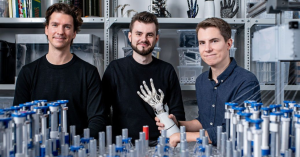- Nooka Space, a startup driving the future of proximate workspaces, announced raising a €2 million investment round from new and existing investors.
- Alongside the round, the company apointed a new CEO, Irina Lenca, an alumna of the Quantic School of Business and Technology and the Ion Mincu University of Architecture.
- With the recent moves, Nooka Space aims to expand its global footprint, targeting new territories such as Portugal and Italy. They also aim to break ground in the aviation sector.
Nooka Space, founded in 2020, operates in ten nations including Romania, Germany, Switzerland, Austria, The Netherlands, and Ireland. They bridge the gap for property owners seeking novel methods to optimize rental revenues and for businesses adapting to hybrid work models.
“Real estate developers are keen to maximize their revenue by renting out under-utilized space, and companies are looking for flexibility. That’s where we step in. We’re the missing link,” explains Leca.
In this context, Nooka Space’s technological infrastructure offers an intuitive search and booking experience for on-demand proximity offices. Their proprietary IoT system can metamorphose any section into a smart workspace. No longer is there a need for traditional reception; Nooka Space hands owners the reins of their booked spaces.
The company is actively looking at licensing its IoT system to other entities, allowing them to monetize their spaces autonomously. These include hotels that want to rent their meeting rooms automatically and airport that want to equip their waiting areas with such workspaces.
The newly appointed CEO gave a sneak peek into their latest products tailored for contemporary professionals, including the Nooka Cube and Nooka Air One, which are adaptable for both indoor and outdoor environments. Additionally, a new product designed for airport lounges is on the horizon.
Aside from accessibility and flexibility, the company also emphasizes the positive environmental impact of Nooka Space’s solution. BY locating smart and autonomous offices in proximity of users, the company helps reduce traffic and resulting CO2 emissions and thus provide a much needed relief for increasingly congested cities.
Going forward, the company bets on the versatility of its business model to help it conquer new markets, starting with Portfual and Italy, as well as easily adapt to any location, from airports and hotels, to train stations, coffee shops, and gas stations.







